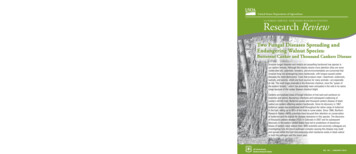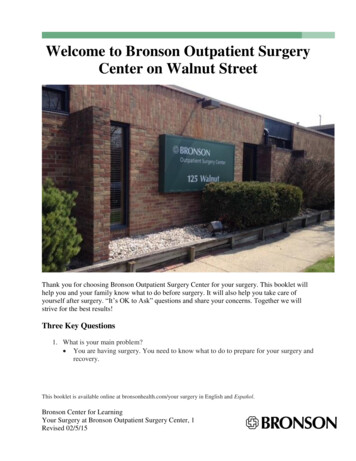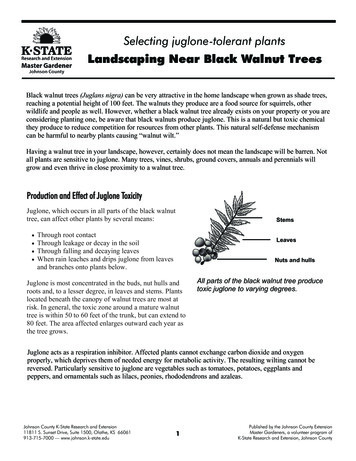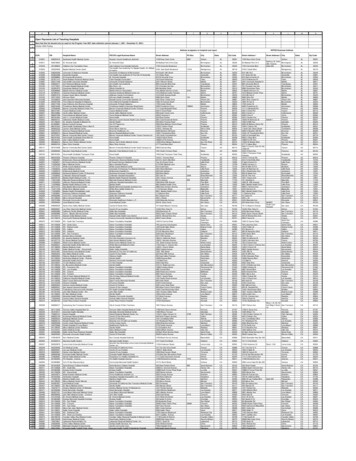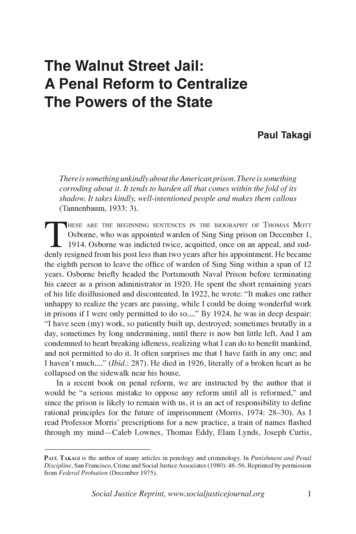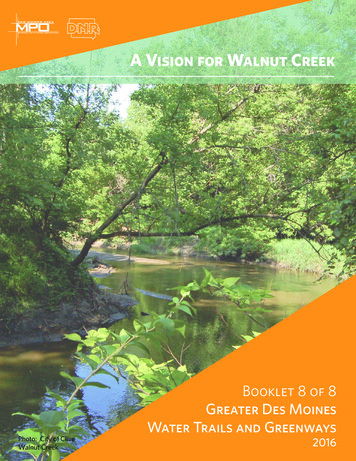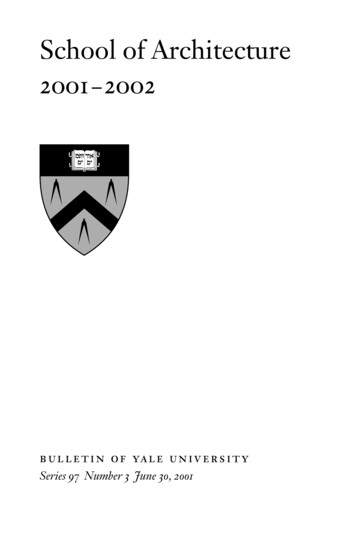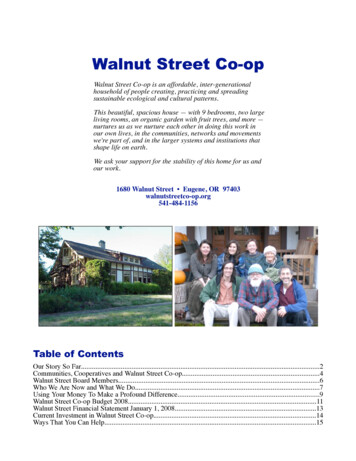
Transcription
Walnut Street Co-opWalnut Street Co-op is an affordable, inter-generationalhousehold of people creating, practicing and spreadingsustainable ecological and cultural patterns.This beautiful, spacious house — with 9 bedrooms, two largeliving rooms, an organic garden with fruit trees, and more —nurtures us as we nurture each other in doing this work inour own lives, in the communities, networks and movementswe're part of, and in the larger systems and institutions thatshape life on earth.We ask your support for the stability of this home for us andour work.1680 Walnut Street Eugene, OR 97403walnutstreetco-op.org541-484-1156Table of ContentsOur Story So Far.2Communities, Cooperatives and Walnut Street Co-op.4Walnut Street Board Members.6Who We Are Now and What We Do.7Using Your Money To Make a Profound Difference.9Walnut Street Co-op Budget 2008.11Walnut Street Financial Statement January 1, 2008.13Current Investment in Walnut Street Co-op.14Ways That You Can Help.15
2Our Story So FarIn September 2000, a group of eight diverse people with shared interests — in community, socialchange, sustainability, and group process — came together to start the Walnut Street Co-op.With a vision of providing affordable housing for an ecologically and socially consciouscommunity, the group moved into this large, rambling, unique two-story duplex in Eugene eastof the University of Oregon.Rolling up their sleeves, they began to reshape the former family residence into a coherent,beautiful shared house fit for a community, with 9 bedrooms, 4.5 bathrooms, 2 living rooms, 2kitchens, a few alcoves and pass-through spaces suitable for bookshelves, craft supplies, etc., and2 dining rooms, the second of which they converted into a sunny shared office space. All thistotals just under 4,000 sq. ft., plus 2 large basements and 2 garages (one for tools and projects,one for bikes and gardening supplies).The original structure of the house that is now Walnut Street Co-op was built in 1906. Thefoundation was laid directly in bedrock, the walls were made of plaster, and giant timbers held itup. The house was well-built and strong — and it still is. In the 1940s a new, very extensiveliving unit was added to the main house.A Beautiful PlaceOur beloved house of many windows sits five blocks from the university, just downhill from oneof Eugene's largest parks, in a quiet neighborhood close to great shopping and buses. In the frontyard we have a lawn, a vegetable garden, berry bushes, and perennial herbs, with young fruittrees and wildflowers growing in the grasses between sidewalk and street. In the back yard, thelawn (which fills with perennial flowers in the spring) is shaded by a tiny but established pearand apple orchard. The house was in excellent condition when we started, and we continue tomaintain and improve it with plenty of small-to-medium-sized projects, as befits a beautiful andwell-used old house.We've done lots of painting, installed light fixtures and interior walls, put insulation in the atticfor increased energy efficiency and between rooms for sound, created a new pump system for thebasement, had plumbing redone, laid new bathroom floor ceramic tiles, and more. A year and ahalf ago, we had professional painters paint the upper exterior, and residents have painted muchof the lower exterior and both garages. The roof is in remarkably good shape and we have hadprofessional estimates of when different parts of it should be replaced. For several years, we'vebeen setting aside funds monthly for that future work.2003 Moving from Individual Ownership to IncorporationAfter three years of settling in, setting up systems, and resident turnover, we decided to establisha solid organizational foundation to ensure the long-term legal and financial welfare of the Coop, moving it from individual ownership to group/co-op ownership as the founders had alwaysintended. Walnut Street Co-operative became a legal corporation with four vested residents onits board. In November 2003 it bought the land and building from the departing owner, Adin,with loans and gifts from two dozen friends and associates.Walnut Street has been an equitable, consensus co-op since its inception. The whole groupmakes all decisions together about day-to-day activities and policies. Only financial, property,and long-term security decisions are reserved for the Co-op board. We share chores and food,
3prepare dinner and eat together five nights a week, gather weekly for house meetings, and holdmonthly work parties. We have an established structure and organization that continues to evolvein creative, caring ways. We recently revised our bylaws to ensure that our Co-op property couldnot be sold for undue personal profit.2008 Today Today, seven years after our Co-op's birth and four years after its incorporation, we findourselves entering a new era, having proven our mettle through many of the ups and downsassociated with co-op living, with solid finances and a well-maintained building, and withvibrant new energy dancing creatively with the solid energy of long-term residents.Friendships continue with housemates who have moved on, a number of whom have chosen tolive and work in the immediate neighborhood, giving us a sense of extended community. While we have no explicitly shared ideology or project, each one of us is involved in work thatis of service to the world. We hope our shared lives can be an inspirational model of living andworking together for community and social change. We seek to put our ideals into practice through activities that lighten our load upon the planetand deal with the practical realities of sharing space together, gathering group wisdom as wego. While we cannot fully live out all of our values all of the time, they are alive in our midst,energizing our conversations and the path we walk together. We seek sustainable life patterns — ones that can continue into the future because theyreplenish rather than exhaust existing resources. In addition to these new physical patterns, werecognize that a key part of sustainability is creating new cultural patterns as well. We seek to create a fertile ground for mutual support, shared activities, a sense of lovingconnection, and a deepening knowledge of ourselves and of group and societal dynamics. And we seek to make a world that is friendly to this kind of living and growth. Living together — weathering storms and exercising our co-creativity — has made usconfident that we can continue to provide long-term housing for low-to-moderate-incomeresidents of Eugene, including ourselves. We hope over time to attract more long-termmembers, but for now we continue to rent rooms to students and others who may live here foronly a year or two. We aim to continue to grow as a community through the transitions, challenges, and peakexperiences of life — through diversity of all kinds. Through children and aging, through spiritual journeys, through loving and conflict, throughdeep authenticity and listening Through inspired studies and worldwork, through illness and injury, through birth and death,and through the natural turnover of housemates as individuals feel called to pursue other lifepaths and places, and new hearts and minds enter and change our world at home.It is so different living togetherthrough all these things .
4Communities, Cooperatives and Walnut Street Co-opCommunity is as old as humanity. As civilization has grown, the kind of close personalinterdependence and communion known to tribes and villages has been progressively replacedwith seemingly independent individuals and nuclear families, living in separate houses andapartments in big towns and cities. We are woven together less by personal bonds and mutualitythan by the vast social machinery — of mass economics, mass governance, and mass media — inwhich we play a tiny part.For the last 200 years, small groups of people have persistently sought to buck this megatrend.They want more community, democracy, self-reliance, and mutual aid at the center of their lives.They want to engage with each other to directly co-create the world they live and work in. Theyare often visionaries, engaged in experiments they believe could ultimately move society towardmore meaningful, effective, cost-effective, and ecological ways of living and working together.The mid-1800s saw the rise of shared-ownership democratic worker and consumer co-ops andspiritually based utopian residential communities, especially in England and the U.S. In Israelwe saw the Kibbutz movement at the beginning of the 20th century. Shared-ownership housingco-ops got rolling in the U.S. in the 1920s and 30s, especially in New York and among students.In Basque Spain in the 1950s perhaps the most successful community-wide co-op establishment,Mondragon, was born. Politically conscious, consensus-based intentional communities had theirheyday in the 1960s and 70s and then faded as many ex-hippies went mainstream.But the dream lived on in networks of surviving communities, endless new experiments, andmillions of individuals who had experienced communal living. The co-housing movement,which arose in Denmark in the 60s, spread to the U.S. in the 80s, offering a greater measure ofautonomy in the midst of community. Today, a wide variety of secular intentional communitiesare arising — from artist colonies and elder communes to ecovillages and permaculture trainingcenters.Enter Walnut Street Founded at the turn of the 21st century, Walnut Street Co-op is a novel, hybrid, urban intentionalcommunity. While proudly part of the long history of communes and co-ops, we are also unique.Some of our defining characteristics are totally original. Others are found elsewhere, but seldomin this combination. And we continue to evolve, quite consciously. We are consensus-based, multi-generational (in our 20s, 30s, 40s, 50s, and 60s), andegalitarian (e.g., same rent for very different rooms, and no one is "in charge"). We share manythings, but are not officially income-sharing. A particularly significant sharing is that the fewresidents who have cars make them available for use by other housemates and non-residentfriends. We are a legal co-op corporation. This usually means all residents are vested shareholderowners. We have neither shares nor shareholders. None of us "own" or can buy or sell theCo-op's building or property or any "part" of it. The Co-op's property is owned by thecorporation, the board of which oversees its maintenance and long-term viability. To includerenters, we have created a distinction among our residents — between "members" (who are theCo-op board with financial commitment and ownership responsibilities) and "renters" (whocan and do carry responsibility in the Co-op, but are not responsible for its long-term wellbeing). Our bylaws are very consciously designed to maintain an egalitarian spirit despite this
5division of responsibility, and we take conscious care to keep our non-hierarchical culturehealthy. Our home is sustained by our shared respect for our Co-op as an evolving shared undertaking,rather than by the kind of shared ideology, activism, business, spiritual belief, selfimprovement practice, or strong leader that undergird so many other intentional communities. As individuals, we are remarkably independent. And we have strong friendships with eachother, as well as commitments to cooking and eating together, attending house meetings, andparticipating in work parties. Without carving our agreements in stone, we share thecommunalist ideal that if a community is designed to serve its members, members can benefitby serving their community. The purchase of our home, instead of being financed by a bank or credit union mortgage, wasfunded by friends and associates, who benefit by their association with us — both personallyand financially, as well as through the shared vitality of our lives and worldwork. This newmodel of home ownership extends our circle of community, and we promote it to othercommunities on our website. Our lives together are profoundly informed by the leading-edge group process and conflictresolution knowledge of several of our members. The Co-op was actually founded by a groupwho met each other at an advanced facilitation workshop. Given our rental arrangement, we have turnover, but friendships remain and many formerresidents return for visits and dinners. Some have become boarders, participating regularly inour shared cooking and dining activities even though they don't live here.We are proud of our place in the unfolding history of intentional communities and co-ops, and ofour innovations that contribute to its evolution. We invite you to join us in that adventure.
6Walnut Street Board MembersJohn Abbe is dedicated to being as alive as possible — and inspiring the same in others,individually and collectively — as part of the overall culture shift to power-with ways of seeing,being, and doing. He's been a process artist from the age of 20, when he fell into "real"community for the first time, took some risks and was amazed at the resulting flowering of trust.In the 1990s he joined the Center for Group Learning in Oakland, where he and Tom becameclose. He is on the Co-Intelligence Institute board. He shares Nonviolent Communication(NVC) in the United States, South Asia and Europe. He also supports fuller and more holisticharnessing of the power of computers and networks, through writing and face-to-face events, andby working at Grass Commons as a software designer for Wagn, their database-oriented wikisoftware. He has also been a short order cook, and helped found the science fiction association atHarvard.Shawna Adams is a sixth generation Oregonian — and first generation college graduate, withmasters degrees in Community and Regional Planning and Historic Preservation. She iscurrently employed as a city planner in local government. She got international communityexperience from her travels throughout Latin America, which have included six months inBolivia as a high school exchange student in a time of political upheaval and two years inPanama as an environmental education Peace Corps worker in the early 90s. In both paid andvolunteer activities, she worked with community service organizations for affordable housing,grassroots community development, wetlands restoration, and historic preservation — includingboard and fundraising experience. She values authentic engagement — including a sustainedcommitment to place that facilitates deepened relationship to people and locale. A resident ofEugene since 1996, she moved into the Co-op in 2003.Tom Atlee has lived in various communes, co-ops, spiritual communities, and other collectiveliving arrangements for 35 of his 42 adult years — 6 of them at Walnut Street Co-Op. He is alifelong activist, writer, social philosopher, founder of the nonprofit Co-Intelligence Institute,networker, consultant, author of The Tao of Democracy, father of a grown environmentalistdaughter, editor of Evolutionary Life newsletter, poet, songwriter, occasional blogger andstrummer on a 12-string guitar, and collector of an unbelievable amount of paper (endless jottednotes, alternative magazines and approximately 3000 books). He is the Co-op's treasurer and oneof its several peacemakers and group-process mavens. His many earlier professions includeecological house cleaner, handyman, food service director, calligrapher, marketing officer,opinion poll director, graphic artist, designer of promo and websites, and office worker — all ofwhich come in handy at times around the Co-op.Karen Mercer has been co-creating nurturing social and political contexts for over 35 years.For the past six, she's been helping the Co-op nurture life-affirming and self-aware activists,activism and eco-practices. Her prior education — she has an MSW in social change theory andpractice and an MSU in Making Stuff Up — is quite useful in the constant "learningopportunity" that IS life in the Co-op. She brings a wide range of experience and world-work —from direct action at Seabrook Nuclear Power Plant, working with poor alcoholics taking care ofeach other and their San Francisco Sixth Street People's Park, organizing war relief contributionsfor the Biafra Christmas Ship, to teaching her course in Creating A Life That Makes More Sense,and teaching and doing peer counseling as part of the Re-evaluation Co-counseling community.Karen's early environmental work — with NYC's first EPA, at the Berkeley Ecology Center, inIndia on the Ganges, and in Czechoslovakia — combined with profound spiritual experiences toinform the deep earth-connection that she feels today.
7Who We Are Now and What We DoAt Walnut Street, we have supported community for seven years now — not only in our houseitself, but in our neighborhood, in Eugene, and by hosting a long list of US and internationaltravelers visiting communities around the country and the world. Each of us works in some wayto shift things in directions that are wiser; more inclusive, democratic and holistic; more lifeaffirming and just. As individuals we support networks, our society, and humanity as a whole inaccessing the collective wisdom needed for breakthroughs in major interpersonal, social, andenvironmental problems. We have also been home to three non-profits founded by housemembers.One is the Co-Intelligence Institute (www.co-intelligence.org), a main focus of which has beenresearching and promoting innovative citizen dialogues to examine issues, articulate communityconcerns and visions, and evaluate candidates, officials and proposed budgets and legislation.We've identified a group of methods — which together we call "citizen deliberative councils" —as the most promising forms of citizen dialogue that can lead to a legitimate voice of the We ThePeople. Hundreds of such dialogues have been convened around the world in a wide variety offorms, both official and unofficial. For more about these and other elements of a wiserdemocracy, see Tom Atlee's book The Tao of Democracy: Using Co-Intelligence to Create aWorld that Works for All.Tom founded, and is on the board of of the Co-Intelligence Institute. In addition, he works withnetworks promoting the conscious evolution of humanity and social systems, grounded in asacred sense of the grand story of the evolution of the universe from the Big Bang until now. Hiscentral colleagues in this work are Michael Dowd, author of the recently published Thank Godfor Evolution! and Peggy Holman, co-author of The Change Handbook: The Definitive Resourceon Today's Best Methods for Engaging Whole Systems.Shawna Adams has for seven years been a City Planner for city government. She has Masters'degrees in Historic Preservation and Community and Regional Planning, and a specialconnection to Panama through her work there in the Peace Corps. She is interested in both thephysical and social aspects of community, and strongly feels that staying in one place is centralto being environmentally conscious.Richard Linsenberg is doing Foundation studies in Anthroposophy, which is a prerequisite forthe Waldorf Schools teacher training program. In his earlier life, he worked in the areas ofmarketing, project/product management, and systems consulting, and ran multi-million dollarprojects for communications and security/identity management systems. He has also spent over20 years exploring and studying various spiritual, esoteric, and health practices.John Abbe is an active member in the global network of folks who practice NonviolentCommunication (NVC), sharing it wherever he has traveled and lived, including California, SriLanka, Europe, and now locally in Eugene. He is a long-time practitioner and networker among awide variety of other powerful individual/social processes and is on the Co-Intelligence Instituteboard. He's also a software designer with Grass Commons (another non-profit Walnut Streethas hosted), and an advocate of free/open-source participation in code and culture.Ellen Range is studying law at the University of Oregon, after working for the Center forConstitutional Rights in New York City, where she worked on the case of murdered Nigerianactivist Ken Saro-Wiwa. She is a Wayne Morse Fellow at the Center for Law and Politics andvolunteers at Legal Aid Services.
8At the center of Karen Mercer's life, work and concerns have been the earth, feminism,democracy, and culture. Partners since 1986, she and Tom met while crossing the US for ninemonths with 500 others as part of the Great Peace March for Global Nuclear Disarmament.During the March they co-created inspiring newsletters for marchers and March supporters. Fiveyears later, 1 1/2 years after the Czech revolution, they traveled thru Czechoslovakia to spreadGreen alternatives, at the invitation of the Czech environmental ministry. In 1996 Karen helpedTom create the Co-intelligence Institute and she served on its board until 2005. Lately she's beenoccupied with family and health issues — her mother's (who died in March 2007) and her own.She delights in reading, reflection, and meaningful talk with people, cats — and now — crows.Liza Kachko moved to Eugene this April to study field botany and herbal medicine. She hasbeen working as an environmental educator and gardener and is putting her experience to workin the co-op garden.Having just completed her PhD in Geography from the University of Oregon, Eve Vogel is busyturning her dissertation on the political history of the Columbia River into a book, and applyingand interviewing for faculty positions. Before returning to academia, Eve spent a decade workingin conservation and development in Peace Corps Honduras, and teaching environmentaleducation and high school biology in and around Portland, Oregon. Nowadays, other thanresearch, writing and interviewing, her son Ari and their shy dog, Anja (who is lively andhappiest when running outdoors), are at the center of her life.Ari Vogel is a thoughtful, engaging three-year-old who likes to hide under our couch's largepillows. He is enjoying preschool, as well as taking breaks to fly across the country as his mominterviews for jobs. His current passion is Bob the Builder, though he happily joins in on almostany creative activity.The Way We LiveTo us part of being a socially engaged institution is living lightly on the earth. This manifests in anumber of ways — our organic garden and orchard . our buying food that is mostly organic,vegetarian and, where possible, locally grown and/or processed, from local co-ops andbusinesses . composting scraps for the garden . using insulation, efficient low-watt bulbs,clotheslines, and bicycles to reduce energy use (there are only two cars at the house) . sharing,reusing and recycling so we generate very little garbage . and generally choosing ecoalternatives whenever we can.We model simple living, open, honest relationships, good group process, and an attitude ofmutual support and sharing. We use the ample common spaces at Walnut Street to engage othersin gatherings here, as well as for our own lives and work.There are many places to put your money to good use in making a better world. We invite you toexplore Walnut Street Co-op as a uniquely promising and intriguing one.
9Using Your Money To Make a Profound DifferenceWe very much appreciate having the Co-op as a stable base for our work, and invite yourparticipation — either as an investor or donor yourself, or by connecting us to others who mightenjoy contributing to our work by helping to secure the Co-op's continuing financial health.You could see this as an investment in high leverage social change and/or as a financialinvestment. While offering modest interest, house equity remains with the Co-op corporation(with very limited equity available to departing long-term Co-op members) to keep Co-opproperty off the speculative market. Walnut Street Co-op welcomes gifts and loans with interestrates from 0% to 5.25%, amortized up to 30 years, with 5-30 year terms. Some of ourcustomized loan contracts allow for early repayment, with specific notice or under certaincircumstances.Future loans will support both our long-term ownership and the greening of our property (e.g.,solar panels). Investments in Walnut Street Co-op are quite secure: Repayment is guaranteed byresidential rents and contingency budgeting, and by our commitment to this project (in which we,too, are personally invested). The house is valued well above its purchase price ( 325,000 in2003) and our current debt load ( 285,349): the county assessment for 2007–2008 is 512,466.In the very unlikely event that we were unable to continue payment on our loans, we expect thesale of the property would enable repayment of all of them. This low-risk, steady-return, sociallyresponsible investment compares very favorably (in all ways other than instant liquidity) tocertificates of deposit, money market accounts and U.S. government bonds.We offer people of means — those hungry for inspiring positive visions and systemic change —a chance to do some powerful good with their money, in a secure (and, if desired, profitable)fashion. Individually we are all involved in a broad array of issues. And the Co-IntelligenceInstitute reaches beyond ameliorating suffering and solving problems — to transformation of thesystemic conditions that generate suffering, including the institutions that we use to solve ourproblems and decide our policies and the future of our world. Money invested in or donated tothe Co-op offers very high leverage for serious social change.Our Current Walnut Street Co-op LoansIn the last year, ten of our investors — all those who set a five year term for their loans when webought our home in 2003 — have had the opportunity to receive balloon payments, or to rollover their loans and keep their investment in our Co-op. These loans had interest rates of 0–6%and ranged from 5,000 to 120,000. The balloon payments due totaled 186,430. Most of thoseinvestors chose to renew. We believe there was good reason to do so, as we are a very safe andmeaningful investment. Our quarterly payment history is impeccable and our property's assessedmarket value is close to double our debt load.In addition to replacing the few remaining loans coming due this year, we also want to fundsome serious green energy upgrades, spurred on by the rapidly rising price of oil. Heating oil isour current source of heat in winter and it is costing co-op residents dearly (our current utilities 105/person/month utility fee will probably rise again this year). In order to financeenvironmentally responsible energy-efficient systems while keeping our rents affordable, weneed to lower the quarterly payments on our current debt load. So we're actively seeking loanswith lower interest rates and long amortizations, as well as outright gifts.
10Although we have a generous offer from a co-op-friendly credit union for a sizeable 6.5% loan,we would love to negotiate personal loans for interest rates of 0–4% (up to 5.25% for largerloans), amortized over 25–30 years. We could use one large loan of up to 150,000, or severalsmall-to-medium size loans totaling approximately that. They could be 5–30 year loans, with allcontract specifics negotiable.Let us know if you would like to invest in our effort — or if you know others who may valueparticipating. We would love to work with you.
11Walnut Street Co-op Budget 200836,92235,52033,88936,180waste/recycling, phone/internet9,0109,3608,93610,710food (& cleaning supplies)12,83012,00011,49512,000utilities: oil, water, electric,interest and financial income4031TOTAL58,80256,88054,35158,890loan payments19,07420,18719,82320,590property taxes5,8936,0705,9846,165insurance (fire liability)2,7713,0482,3673,000waste/recycling, phone/internet8,7029,6359,88210,752office and recruitment andbank fees247350310350400121400843900715900maintenance: major &capital improvements*6,3062,0402,0402,360roof ,00011125075480425250300Expensesutilities: oil, water, electric,equipment, furniture & majorappliancesmaintenance: minor, housesupplies, repairsfood (& cleaning supplies)gardenprocess support
12recreationother 558,890-7-1001160548* The "roof" and "maintenance - major & capital improvements" are set-aside accounts whichroll over. The actual 2007 expenses from the set-asides in these categories were 0 and 1240respectively.** "Other" for 2008 includes 455 for an extra "empty room monthly equivalent"(ERMEs). We budgeted the rent and utility income above to include five ERMEs, aswell. This is to deal with empty rooms during housemate recruitment.
13Walnut Street Financial Statement January 1, 2008AssetsProperty (county assessment): 512,466Checking Acct: 7,009Rent & Utilities Fees Due (Jan): 3,010Co-op Furniture & Appliances (est.): 1,000Savings account: 2,415Total Assets: 525,900Lia
intended. Walnut Street Co-operative became a legal corporation with four vested residents on its board. In November 2003 it bought the land and building from the departing owner, Adin, with loans and gifts from two dozen friends and associates. Walnut Street has been an equitable, consensus co-op since its inception. The whole group
